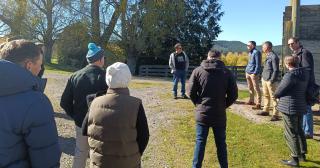Search results
Displaying 181 - 190 results of 424
- Low Input Progeny Test highlights power of genetics …

- … pigs Can be very damaging in sheep Danger period is winter Nematodirus Thin-necked intestinal worm Danger period is early spring and throughout summer Ostertagia osertagi Medium stomach worm Most significant worm for NZ cattle Type I … drench). It is important this is given at the right time to be most effective on your property – generally late summer/early autumn to prevent an autumn larval peak of resistant parasites on pasture. The purpose of a knockout drench is to …
- Page… productivity traits such as lamb growth. Dagginess tended to increase if it was not culled for. We are well past that early stage. The negatives from selecting for low FEC have been counteracted by using index selection for high production … as they become immune to worms. Find out more through these questions and answers (PDF, 535 KB). Lambs with high and early CARLA responses have lower FECs and higher liveweight gains under worm challenge. Selection for resistant animals … is based on ‘time to first drench’. Superior animals are those that continue to grow for the longest period after weaning before needing to be drenched. Such animals do not necessarily have a higher or lower FEC than their flock-mates. …
- Catchment work celebrated by farmers, iwi and rural professionals …

- Farmer advisory group explores sheep research …

- … FE. Watch Facial Eczema Sheep Poo Study: Q&A session . B+LNZ's Cara Brosnahan and Ginny Dodunski talk about the early insights for years one and two, and answer questions about FE in this Q+A session. Helpful videos about collecting …
- ‘Farmer Time for Schools’ bridges gap between students and farm life …

- … in collaboration with Federated Farmers. The Government announced it would postpone a decision on the NPSIB until early 2021. Since then, B+LNZ has advocated for this to be further delayed, given the amount of work that needs to be done …
- There are a range of approaches being followed by countries to reduce agricultural emissions. Our farmers are committed to the environment and are making substantial investments and progress. While we acknowledge there’s an expectation that further progress needs to be made in reducing agricultural emissions, B+LNZ is concerned about many of New Zealand’s current climate change policies. There is currently a narrative in New Zealand that agriculture was ‘let off the hook’ by excluding …
- Beef + Lamb New Zealand elects new Chair …
